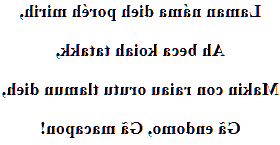Coroado love poem
Laman náma dieh poréh mirih,
Ah beca koiah tatakk,
Makin con raiau orutu tlamun dieh,
Gã endomo, Gã macapon!

Meaning of this translation in Portuguese.
Na Alma do Rio vejo seu rosto,
Te falo com o coração,
Mas se vc não ser guerreira e andar,
Eu vou embora. Eu te amo!
Which gives in English
I see your face, in the soul of the river
I speak to you with my heart,
but if you are not a warrior and walk,
I'm leaving. I love you!

→ French poem ←
Purí language
The words "mirror", "poem" and even "quick" don't exist in Coroado (Puri, colorado, Paquí, Telikóng), so i have translated into Portuguese and English this interpretation of my poem.
Explanation: "O rio pra nós indígenas é sagrado e tem vida, e por isso leva a palavra alma, (laman), ja a palavra ( raial orutu, ) é a pessoa guerreira que luta , avança e não desiste. A poesia são palavras, sentimentos que brotam no coração , palavras boas, por isso (ah beca koiah tatakk)" = "The river for us indigenous people is sacred and has life, and that is why it takes the word soul, (laman), while the word (raial orutu,) is the warrior person who fights, advances and does not give up. Poetry are words, feelings that spring up in the heart, good words, that's why (ah beca koiah tatakk),"
The different variants of the puri language (here coroado) .... a extinct macro-Gê language ... are those of the indigenous peoples of Tapuia nations (indigenous peoples speaking non-Tupi languages), in the southeast region of Brazil, in Espírito Santo, São Paulo, Minas Gerais and Rio de Janeiro, around São Fidélis. It's thanks to the current will, of ethnic recognition, of natives of Puri origin that the language tries a bit to be reborn.
Macro-Gê language
The classification macro-jê (macro-Gê) at the origin comes from the distinction made by the Portuguese when they meet the indigenous people in the 16th century. They divided these peoples into two large groups, the Tupis-guaranis and the Tapuias ... the Tapuias being all the indigenous peoples who spoke non-Tupi languages, which very often seemed, seem to them more "primitive" than those of Tupi languages. In the 20th century, this word tapuia was replaced by jê (gê) to designate the group of languages.